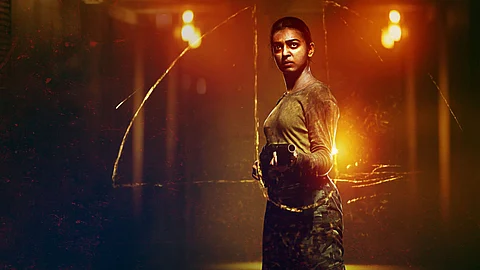

What if a prisoner enters a frightening detention centre but ends up being scarier than anything or anyone its blood-soaked walls and floors have seen before? That’s the premise British filmmaker Patrick Graham set out with over four years ago when he first developed the concept of Ghoul. The second Netflix original from India, Ghoul is jointly produced by Blumhouse Productions (Get Out, Insidious), Ivanhoe Pictures (The Wailing, Crazy Rich Asians) and India's Phantom Films (Sacred Games).
Set in a not so distant but definitely dystopian future, Ghoul establishes a country, presumably India, where cities are divided into religious zones. Nationalistic fervour is slowly morphing into a paranoid psychosis, and the lines between the protector and the persecutor have all but blurred. The government or the military power that rules this nation has laid down strict diktats which control every aspect of its citizen’s lives. Any detraction from the prescribed norms results in a reformative programme quite cleverly called a ‘wapasi’ (return) programme.
Books and personal items can be deemed anti-national and basic constitutional rights have been suspended. From young students to political leaders of the opposition, anyone not subscribing to the majoritarian agenda are deported to covert detention centres where they are subjected to inhuman torture and eventual death. One such detention centre is Meghdoot 31, where protagonist Nida Rahim (Radhika Apte) finds herself transferred five weeks before she completes her training as an advanced interrogator.
Constantly under scrutiny for her religious identity, Nida is zealous in her attempts to prove her loyalty, and even turns in her own father when he refuses to teach only the state prescribed syllabus. At Meghdoot 31, she reports to decorated army officer Sunil Dacunha (Manav Kaul) and sadistic interrogator Lakshmi Das (Ratnabali Bhattacharjee) who are in charge of ‘breaking’ the men and women brought in. Nida’s arrival coincides (or does it?) with the arrival of Ali Saeed, a dangerous and wanted terrorist who has killed hundreds around the world. Nida soon senses that there is more to Saeed than meets the eye, and suspects that he may not even be from this world.
Her suspicions are dismissed by her colleagues, a decision that they pay for dearly, and with much blood and gore.
Cinematographer Jay Oza and production designer Vineeta Bansal create a soul-sucking atmosphere in Meghdoot 31, an apt scenario to introduce a ghoul into. Summoned by making an offering of blood that is used to draw its symbol, the ghoul as per Arabian folklore lived in graveyards and ate human flesh. It then took on the human form of the last person it attacked. It also plays with the minds of its victims, mirroring their guilt and playing with their minds before consuming their flesh.
The show uses the myth of the shapeshifting flesh-eating monster in the real and metaphoric sense. So while a real ghoul turns the task force against each other before going on a bloodthirsty murder spree, there are allusions to the military themselves being a group of blood-sucking monsters who prey on the minds and bodies of other men. Making a deal with the devil has always been used in a negative sense, but Ghoul subverts this motif by depicting a murderous invisible force as the last hope of a society where men are deadened, and God is dead.
The makers have crafted reminders of historical events where hundreds of innocents lost their lives to cruel regimes. Dacunha tells Saeed about how his ancestors helped the Portuguese rulers weed out and persecute those pretending to be Christians. There is a particularly poetic sequence where Nida sees the spectacles and wallets of men who lost their lives in the execution chamber of the centre. It’s a haunting reminder of visuals from concentration camps where millions of Jews died in gas chambers, simply because the regime believed they were not ‘Aryan’ enough.
While the idea of a mythical shapeless monster unleashing death in a living hell is intriguing, Ghoul could have benefitted from a few additional episodes to add backstory and depth to its characters. It seems a little unbelievable that hardened, indoctrinated officers can succumb so easily to just one encounter with Saeed.
Radhika Apte is in great form, bringing restraint and realism to Nida’s torment. It’s a role that could just end up seeming trite or shrill, but Apte gets into Nida’s skin with ease. Manav Kaul is reliably good too, but just when he is really getting into the groove, the series draws to a close. Mahesh Balraj is convincingly scary as Ali Saeed, while veteran actor S.M. Zaheer as Nida’s father and Ratnabali Bhattacharjee chip in convincingly in their crucial but underwritten roles.
In a global environment where regimes in India and abroad are trying to make countries "great" again or bring back "ache din", Ghoul sounds a warning bell of the dangerous consequences of state sponsored intolerance. Like its titular ghoul, it reflects the cruelty and depravity we are all capable of and is an unfortunate reminder that inspite of the millions who lost their lives over the centuries, human beings are a cursed lot who will succumb to the same divisive demons of religion, politics, and their lovechild, intolerance.